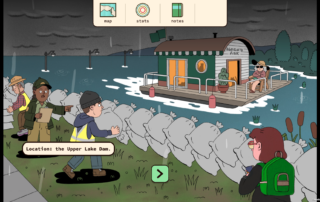Drive by this quintessential Door County farm and you’ll discover goats under the giant willow tree and if you look a little closer you are most likely to spot Lynne Grasse. She’s the animal lover in the middle of her treasured Nigerian Dwarf Goat herd.
She gets lot of curious Door County visitors stopping at the corner to see her goats. Grasse said, “I think when people stop along the road they look out over all the different colors and the babies and they see them peacefully grazing I think that they just kind of look like a walking flower garden.” This garden is also known as Grasse Acres near Ellison Bay where you’ll also find Bourbon Red Turkeys, geese, and chickens. But the pint-size goats are the center of attention and they follow Grasse wherever she goes.
Grasse is a retired teacher but she uses that term loosely. “I see a happy place to retire. Retiring is kind of a funny comment in itself because farming is nothing like really retiring. It’s a lot of work.” Grasse traded in her work with “kids” in the classroom for a different kind of “kids” in the barnyard. Grasse said, “I did teach kindergarten for 19 years but instead of continuing on in that field I decided to just do this.” Raising dwarf goats has become her passion even though it is met with some skepticism. Grasse said, “People will say, why Goats? Why do you want goats? A lot of people hear old stories and they think of them as being dirty and stinky. The bucks are what gives goats a bad name because they are stinky, but they are just as sweet and loving as the girls.” Just think in terms of the book “Billy Goats Gruff” and you’ll understand what Grasse means.
She started raising goats around 1997 along with her three sons. Grasse says, they got a couple of goats and thought well, that’s a good idea it will help them to learn to be responsible, respect living things but as time went on it was very clear Grasse was the one who had the passion for them. You can see that in how she talks about them, “Usually at the end of the day my hair is all chewed up and gnarled and I got little hoof prints all over my clothes. “ And she can hardly contain her smile and affectionate laugh.
Now that her sons are grown-up and moved away Don, her husband is her right hand man. Grasse said, “Don is wonderful at making sure they are fed and he grows most of the feed that they eat and the hay. I feel like getting back to a more self-sustained way of living is important with him enjoying the growing aspects and with me enjoying the animal aspect of the farm, I think we make a pretty good team.” As a team they care for and nurture their dairy herd.
The young goats can attest to that as Grasse calls them for dinner repeating over and over, “Come on little babies. Come on little babies.” It doesn’t take much encouraging the goats know what happens next. Grasse and her husband even designed a 10 goat kid feeding bucket so she can feed 10 babies at once. When she first started she bottle fed all her babies which would take hours and now she’s done in minutes and the babies are happier too because they can eat faster.
The Nigerian Dwarf goats are also getting Grasse noticed. She’s now breeding the goats and shipping them coast-to-coast. Grasse said, “I’ve shipped some to California. Most of the goat kids that I sell go to Illinois, Minnesota, Wisconsin, and Michigan.” One of the things about kidding season is it can happen at any time, day or night. So Grasse installed a barn camera to keep an eye on the pregnant mommas. Grasse says, “I can just sleep on the couch and peek every once in a while and see if anything’s happening. But as soon as they’re ready I’m out there catching babies.”
Her biggest batch of babies found a new home just south of the Wisconsin border. Glenn Granat, Curator with the Brookfield Zoo near Chicago said, “First of all we were looking for a really high quality herd that we found up in Wisconsin. And this is the name that kept coming up was Lynne Grasse up in Door County.” Granat told her he needed 30 goats.
In the spring of 2015 Grasse helped deliver 30 kids. Most of them were born in March and April. Grasse said, “This was definitely a spring with a purpose.” The Brookfield Zoo took delivery of the 30 baby Nigerian Dwarf Goats in late June 2015. Granat says, “He is overly impressed with the quality of the animals.” It’s their gentle nature and curiosity that make them a good addition to the petting zoo. The Nigerian Dwarf Goats are very colorful, their small size makes them easy keepers.
Granat says, The Brookfield Zoo has had goats in a petting situation probably since the 1950s. The original children’s zoo when it opened in 1954 had goats. So the zoo has a long history of generation after generation coming and interacting with the goats. And there’s people bringing their grandkids and their great grandkids into the same place they went as children to meet our goats.
Kids can come into the petting zoo and they can brush’em. From outside fence, they can feed’em. They can get up close and personal with the goats. They’re extremely friendly. Granat says there’s a reason for all of this, “It’s very important for people to get close to animals in order to care about nature. We only care about what we are close to. And if we get close to goats and other animals, we will definitely be engaged in nature.”
Besides their wonderful personalities Grasse said the goats are beneficial in another way. The extra goat milk is used to sustain a more natural, healthy way of life on the farm. For someone like Grasse who likes to milk and enjoys making cheese these goats are ideal. The milk that comes from the Nigerian Dwarf Goat is very high in butter fat and because of that it makes the best cheese.
Grasse says, she’s experimented with all different kind of cheeses. She’s made cheese curds, mozzarella cheese and feta cheese. But her favorite – her all-time favorite is Chevre. She laid out a spread of cheese on her kitchen counter and showed us all the different kinds of Chevre. Grasse describe it like this, “This Chevre has dried cherries added to it that rehydrate after you put it in the cheese. And then this one is an herbed cheese log. But you can also use it for cherry cheese pie. Anything you would use cream cheese in you can use the Chevre with and this is Keifer and this is yogurt. I’m really happy with my yogurt.”
Grasse says, “The other thing that’s really awesome about Nigerian Dwarf Goat milk is it has a really sweet flavor.” And if you’ve tasted bitter goats milk Grasse can explain, “A lot of people say oh, I don’t like goat milk. It’s so goaty. But the thing that makes goat milk goaty is often times the environment that you are milking. If you’ve got some bad odors. Like if there’s a buck around or something, your milk will pick up that odor. Or if you buy goat milk in the grocery store sometimes it has kind of a goaty flavor and that’s because somewhere in the processing or maybe in the age how old it is – it picks up those flavors.” Who knew? Lynn Grasse did.
Her Door County farm would not be complete without the miniature goats roaming freely in the barnyard, jumping on the rocks and resting under the shade of that giant willow tree. Grasse says, “They’re such a wonderful, peaceful, calming part of my life. They really fulfill something in me, a need to nurture. And when I look out over the pasture and I see them out grazing, it just makes you feel like, this is where I want to be.” Grasse describes her farm as the most beautiful place in the world.










